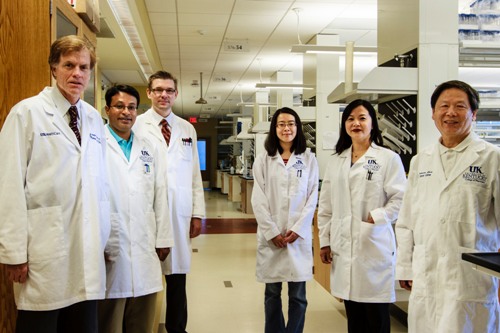Researchers at the University of Kentucky have developed a technique to fabricate ultrastable RNA nanoparticles that are capable of treating viral infections and cancer by controlling cell functions and fastening to cancer cells without causing damage to surrounding tissues.

The research team on this study includes (L-R) Markey Cancer Center Director Dr. Mark Evers, Farzin Haque, Dr. Piotr Rychahou, Yi Shu, Dan Shu and Peixuan Guo. (credit: UK HealthCare)
The research was conducted in the lab of Peixuan Guo, the William S. Farish Endowed Chair in Nanobiotechnology at the UK Markey Cancer Center, with the help of Dr. Mark Evers, Director of the UK Markey Cancer Center. In the study, RNAs were utilized as building blocks by the researchers for the bottom-up production of nanostructures.
The researchers utilized the RNA nanotechnology developed by Guo for the fabrication of ultrastable X-shaped RNA nanoparticles from re-engineered RNA fragments for carrying up to four diagnostic and therapeutic modules. These RNA nanoparticles comprise micro-RNA for controlling gene expression, aptamer for targeting cancer cells, tiny interfering RNA for gene silencing, or a ribozyme that is capable of catalyzing chemical reactions.
The study showed that regulation of cell functions can be gradually improved with the increasing count of functional modules in the RNA nanoparticles. According to Guo, the researchers have found a way to develop thermodynamically and chemically stable RNA nanoparticles that can serve as therapeutic reagents.
The RNA nanoparticles’ polyvalent nature enables them to simultaneously deliver multiple functional molecules to achieve synergistic effects. Their modular design facilitates controlled self-assembly with definite structure and their thermodynamic stability keeps them intact in human and animal human circulation systems, in which they occur at ultralow concentrations. Their chemical stability makes them resistant to RNase digestion in the blood serum.
Evers informed that this nanotechnology method facilitates more-efficient treatment of cancer metastasis with reduced side effects.
The study findings have appeared in Nano Today.
Disclaimer: The views expressed here are those of the author expressed in their private capacity and do not necessarily represent the views of AZoM.com Limited T/A AZoNetwork the owner and operator of this website. This disclaimer forms part of the Terms and conditions of use of this website.